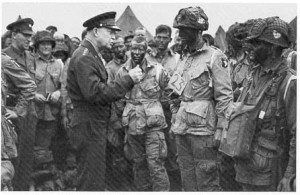 When describing the design for the proposed monument honoring President Dwight Eisenhower, Washington Post cultural critic Philip Kennicott referred to it as “a relatively small representation of Eisenhower.” He went on to say that the small representation acknowledged that “there were many other men who could have done what he did, who would have risen to the occasion if they had been tapped.” When I read this in George Will’s column, Reasons to Like – and Honor – Ike, I was dumbfounded. I was struck by the naiveté and the disrespect that these words conveyed.
When describing the design for the proposed monument honoring President Dwight Eisenhower, Washington Post cultural critic Philip Kennicott referred to it as “a relatively small representation of Eisenhower.” He went on to say that the small representation acknowledged that “there were many other men who could have done what he did, who would have risen to the occasion if they had been tapped.” When I read this in George Will’s column, Reasons to Like – and Honor – Ike, I was dumbfounded. I was struck by the naiveté and the disrespect that these words conveyed.
As I reflected further on the statement, I chose to accept that the words may have been taken out of context, but I still felt compelled to explore two concepts related to the remarks. First, I believe that Kennicott was acknowledging the limitless leadership potential that everyone possesses. This is something that I passionately believe. I am often asked whether leaders are born or made. I always answer, “Yes, leaders are born and then they are made.” We are born with the capacity to lead, but it is up to us to choose to develop that potential. We must also choose to lead when we are presented with the opportunities that life throws our way.
True leaders do not wait to be “tapped.” They see leadership opportunities, and they seize them. President Eisenhower’s career is full of examples of his choices to embrace the leadership challenges before him. Certainly, there were times when others “tapped” him to lead, but more often he placed himself in situations where his talents would be recognized and used. Throughout his career, Eisenhower prepared himself for bigger and more difficult leadership challenges. He rose from Lt. Colonel in 1936 to General of the Army in 1945. He received six promotions in nine years. These opportunities were not simply given to Eisenhower. Before anyone “tapped” him, he had demonstrated his readiness to lead. His string of successes and his response to failures proved his worthiness.
As Supreme Allied Commander, Eisenhower faced a variety of challenges for which he was uniquely qualified. He had to contend with strong politicians like Churchill, Roosevelt, and de Gaulle. He had to deal with strong-willed and often defiant subordinates. He had to manage the egos of several of these subordinates who, at time, out-ranked him. Kennicott seems to believe that any of the other leaders waiting in the wings would have handled these situations with the effectiveness Eisenhower showed. I think that is absurd.
These situations reveal the second concept worth exploring. Our shared limitless potential does not mean we have equal competence. Eisenhower brought a combination of skills and abilities to bear that enabled him to lead through a variety of difficult situations. We all have a distinct set of gifts and talents. How we use them often determines our success. To say, “there were other men who could have done what he did,” denies the fundamental truth that we are all unique. All of the others waiting in the wings would have dealt with the leadership challenges differently. It is impossible to know what the outcomes would have been.
Eisenhower’s willingness to choose to lead combined with the skills and abilities that defined him as a leader continued to serve him throughout his Presidency. From desegregation and the construction of the Interstate Highway System to the Korean War, Eisenhower led with determination and strength. Certainly, we can look back and second-guess some of his decisions, but we enjoy the clarity amd full knowledge of hindsight. In the moment, Eisenhower led based on the information he possessed, and he led well. When we presume that any of the other would-be leaders could have done as well, we deny the unique gifts and qualities and the personal commitment that make us who we are. For the rare few, this means greatness, and we must celebrate and honor that greatness.
Testimonials
Ph.D., Director, Gilliam Center for Free Enterprise and Ethical Leadership and Professor, Management Department, College of Business, James Madison University
Ph.D., Director, Gilliam Center for Free Enterprise and Ethical Leadership and Professor, Management Department, College of Business, James Madison University
President, AAISP – DC
P.Eng., President ACT Canada
President, Arneson Leadership Consulting
(Steve was named one of the country's Top 100 thought leaders on leadership in 2008, 2009 and 2010, and one of the Top 25 leadership coaches in America for 2008, 2009 and 2010 by Leadership Excellence magazine. )
Former Governor and Senator, Commonwealth of Virginia
EVP and CFO, Intersections, Inc.
(USN ret.), former POW
President, Financial Services, Capital One
CEO, Korea Exchange Bank
formerly management columnist at the FT, now Visiting Professor at the Cass Business School, London, and director of strategy at Edelman in the UK
former Commanding Officer, USS Dwight D. Eisenhower, CVN-69, and recipient of the John Paul Jones 'Inspirational Leadership Award' from the Navy League of the US.
Professor Emeritus, Darden Graduate School of Business, University of Virginia
Co-author Anytime Coaching: Unleashing Employee Performance Adjunct Professor, Johns Hopkins Carey Graduate School of Business
Bishop Emeritus of Richmond
Professor Emeritus, Darden Graduate School of Business, University of Virginia.
Head Coach, Butler University Men’s Basketball Team
Managing Director, Merrill Lynch Wealth Management
Author of Be Your Own Coach, and On Becoming a Leadership Coach, and creator of the Georgetown University Leadership Coaching Program





